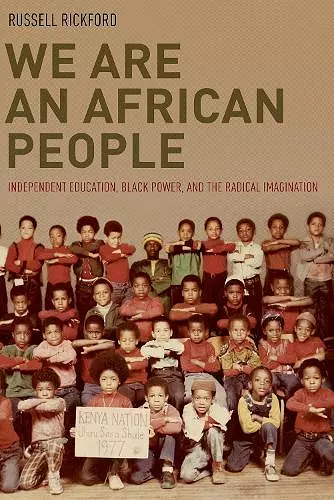We Are an African People
Independent Education, Black Power, and the Radical Imagination
Format:Paperback
Publisher:Oxford University Press Inc
Published:5th Sep '19
Currently unavailable, and unfortunately no date known when it will be back
This paperback is available in another edition too:
- Hardback£37.99(9780199861477)

During the height of the Black Power movement of the late 1960s and 1970s, dozens of Pan African nationalist private schools, from preschools to post-secondary ventures, appeared in urban settings across the United States. The small, independent enterprises were often accused of teaching hate and were routinely harassed by authorities. Yet these institutions served as critical mechanisms for transmitting black consciousness. Founded by activist-intellectuals and other radicalized veterans of the civil rights movement, the schools strove not simply to bolster the academic skills and self-esteem of inner-city African-American youth but also to decolonize minds and foster a vigorous and regenerative sense of African identity. In We Are An African People, historian Russell Rickford traces the intellectual lives of these autonomous black institutions, established dedicated to pursuing the self-determination that the integrationist civil rights movement had failed to provide. Influenced by Third World theorists and anticolonial campaigns, organizers of the schools saw formal education as a means of creating a vanguard of young activists devoted to the struggle for black political sovereignty throughout the world. Most of the institutions were short-lived, and they offered only modest numbers of children a genuine alternative to substandard, inner-city public schools. Yet their stories reveal much about Pan Africanism as a social and intellectual movement and as a key part of an indigenous black nationalism. Rickford uses this largely forgotten movement to explore a particularly fertile period of political, cultural, and social revitalization that strove to revolutionize African American life and envision an alternate society. Reframing the post-civil rights era as a period of innovative organizing, he depicts the prelude to the modern Afrocentric movement and contributes to the ongoing conversation about urban educational reform, race, and identity.
[A] strong, scholarly contribution to a much overlooked and continuing educational experiment, one that will, we should hope, start a great many debates that don't have easy answers. * Charles Payne, History of Education Quarterly *
[A] significant contribution to the historiography of black power. In this thorough and comprehensive look at black power educational institutions, Rickford reconstructs the history of pro-black power institutions providing instruction, from prekindergarten through high school and postsecondary levels....Rickford should be complimented for thorough research and narration. This excellent book is a 'must' for all interested in black power and African American education. * Akinyele Umoja, The Journal of American History *
We Are An African People imparts a crucial pedagogical lesson for activist teachers, for administrators of independent Black schools, for all antiracists. Rickford reminds us: To truly be engines of Black liberation, we must seek to reflect-not rehabilitate-the culture of African Americans. * Ibram Kendi, African American Intellectual History Society Roundtable *
A much needed and sobering account of how patriarchy and sexism undercut the potential of Black Power, Pan-Africanism, and the black independent school movement. * Ashley Farmer, African American Intellectual History Society Roundtable *
Meticulously researched, erudite in its judgments, and analytically sophisticated. In my estimation, it leap frogs to the forefront of Black Power Studies and should be a welcomed addition to the field and beyond. * Fanon Che Wilkins, African American Intellectual History Society Roundtable *
Deftly combining intellectual history with a rigorous attention to the local, national, and international currents that spurred the movement, Rickford illuminates the role of autonomous educational institutions in the quest for black liberation...Deeply researched and brilliantly argued. * Reena Goldthree, African American Intellectual History Society Roundtable *
With an unshakable grip on materialist analysis, Rickford casts Black Power as a discourse used to solve the material problems of white racism. * Public Books *
An extraordinary book. By focusing on the activists who sought liberation through education, Russell Rickford transcends old debates over Black Power's origins, divisions, efficacy, and leadership, and cuts to the heart of the movement's raisonne d'etre: to build independent institutions and empower a new generation of Black people. This is not just a chronicle of the Afro-centric school movement; it is a radical revision of the possibilities and perils of Black Liberation during what may be its most fertile period: the 1970s. Black Power Studies will never be the same. * Robin D. G. Kelley, author of Africa Speaks, America Answers: Modern Jazz in Revolutionary Times *
We Are an African People is the definitive study of the radical independent schools movement that flourished during and after the Black Power Movement's heyday. Russell Rickford's meticulously researched account illuminates the depth and breadth of grassroots, middle-class, and elite struggles to reimagine black identity through African centered education that prefigured contemporary debates over Afrocentrism. A must read for all students and scholars of the black freedom struggle. * Peniel E. Joseph, author of Stokely: A Life *
We Are an African People is an insightful and impressively researched study of an important aspect of the Black Power and early Black Studies movements that had previously received little scholarly attention. Through his focus on independent black nationalist educational institutions, Russell Rickford convincingly reveals Black Power as both a visionary and practical movement. * James Smethurst, author of The Black Arts Movement: Literary Nationalism in the 1960s and 1970s *
- Winner of Winner of the Liberty Legacy Foundation Award of the Organization of American Historians.
ISBN: 9780190055530
Dimensions: 155mm x 231mm x 25mm
Weight: 612g
402 pages